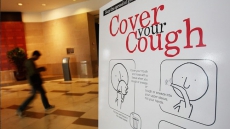TORONTO — Several provinces and at least one territory are experiencing outbreaks of pertussis, better known as whooping cough, and public health officials are encouraging Canadians of all ages to make sure their vaccinations are up to date.
The bacterial infection, which often but not always causes a "whoop" sound when breathing or coughing, is particularly dangerous for very young babies, say doctors. The disease can lead to hospitalization and, in rare cases, death.
Manitoba is dealing with an outbreak of pertussis in its southern region, where 44 of the province's 51 cases so far this year have been reported.
Most of those who developed the infection had not been inoculated against pertussis, which is included in a vaccine that typically also protects against diphtheria, tetanus and polio. Some provinces also include Haemophilus influenzae type B vaccine (Hib) or hepatitis B in the shot.
"You have outbreaks from time to time, but we're usually around 10 per year, so this is significant," Dr. Michael Routledge, Manitoba's chief public health officer, said Thursday from Winnipeg.
Most of those who got sick were young children, but some teens and adults also contracted the infection, Routledge added.
"We're concerned this is happening in kids who are quite young and they can have serious complications from it."
Whooping cough is the second most common infectious childhood disease in Canada, after influenza. While the disease is endemic, or always present in the community to some extent, outbreaks tend to be cyclical, with a spike in cases every two to five years.
Pertussis often mimics cold viruses in its symptoms — runny nose, nasal congestion, red and watery eyes, and fever — but its signature hallmark is a cough and severe wheezing that can persist for weeks. As with cold and the flu, the highly contagious disease is passed through saliva and mucus from person to person.
Infants, especially those under four months of age, are at risk for life-threatening complications such as pneumonia; an inability to breathe (apnea); seizures; and brain damage.
New Brunswick has also been dealing with a pertussis outbreak. The province has recorded 56 confirmed cases this year, all in the Greater Moncton area, including four new cases reported between Nov. 6 and Nov. 12 in residents aged nine to 24, a spokesman said.
The Northwest Territories has also had a jump in whooping cough cases this year.
While Ontario has had some isolated outbreaks, Dr. Shelley Deeks said 2015 has "not been a huge year" for pertussis, at least compared to some previous years.
Deeks, medical director of immunization and vaccine-preventable diseases, said Public Health Ontario has received reports of about 500 cases to date — far below the peak of more than 1,200 cases recorded in 2006.

In 1997, Canada switched to an "acellular" vaccine that had fewer side-effects than the whole-cell vaccine previously used. But the newer vaccine has been found to be less effective over time than the old one, creating what doctors call waning immunity — and possibly leading to a rise in cases.
That means that besides the initial vaccine regimen — shots at two, four and six months, and boosters at 18 months, four to six years old and 14 to 16 years old — adults should also have a pertussis booster at least once more in their lifetime, said Deeks.
"So adults should talk to their physicians and make sure they receive a dose of pertussis," she said, noting that the shot would typically also contain diphtheria and tetanus components.
"It's really important for their health, but the other thing we know is that parents and grandparents are an important source of pertussis for babies. And because the disease can be quite severe in infants, we want to make sure adults are protected for it so they don't pass it onto their children, especially newborns."
British Columbia is also seeing a bit of a jump in whooping cough his year, with double the number of cases reported in 2012, but half the case count in 2000 — reflecting the cyclical nature of the infection, said Dr. Danuta Skowronski, an infectious disease expert at the BC Center for Disease Control.
The highest proportion of cases in B.C. is among pre-teens aged 10 to 13, suggesting that waning immunity could be at play, as children that age would have had their most recent dose as four- to six-year-olds, said Skowronski.
While the goal of public health officials isn't to eradicate pertussis — an impossible goal given its endemic nature — it's not clear how more-consistent protection can be achieved.
Giving boosters more often would be like "chasing a moving target," Skowronski said.
"Do you add more doses? Or are we approaching the kind of program like we have with influenza ... where you have to give it annually or at least every few years?"
Because about 80 per cent of the serious outcomes due to whooping cough occur in babies under three months, Skowronski believes that's where the primary focus of immunization should be placed.
"It's most important that we get that first dose into children in a timely way, without delaying. Parents should be on that."
At the same time, drug companies may need to come up with a better vaccine that could be given sooner than two months old, offering earlier protection, she said.
"We're getting signals now of concern that we need to address, and especially if we are accumulating cohorts (groups) of children with waning immunity," Skowronski said of the outbreaks.
"It's not scary monsters right now. But we want to look to the future and anticipate if this gets higher yet with the next cyclical peak. And what are the options that we might implement to try to mitigate that?"





